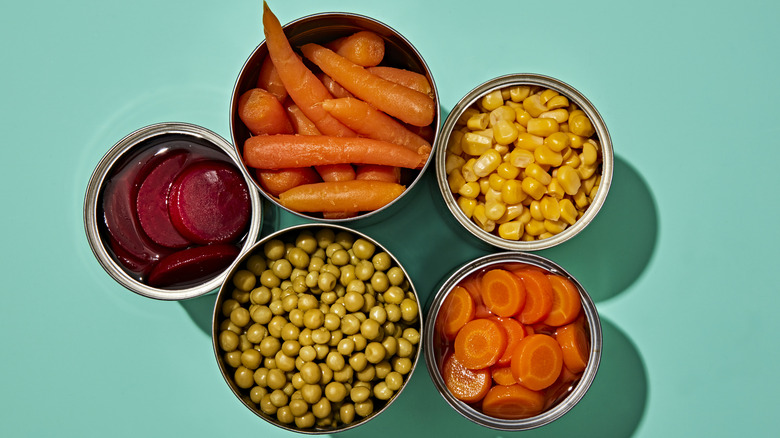The Type Of Canned Vegetables You Should Avoid
Despite their slightly controversial reputation, canned vegetables are actually a good and easy way to get more servings of veggies in your diet. In fact, they're no less legit than fresh or frozen vegetables, as long as you're keeping an eye on one major red flag: salt.
Salt isn't just added to preserve canned foods — it's also there to make the veggies taste better. But if you start cooking a meal with overly salty vegetables, you have less control over how the dish tastes in the end. Plus, too much salt can come with negative health consequences. Considering more than 70% of our sodium intake comes from packaged and restaurant foods, we're probably already adding way more salt to our meals than we realize — and we don't need more of it mixed in with our canned vegetables.
But for those canned corn enthusiasts out there, don't worry. You can always choose canned vegetables labeled "no salt added" or "low sodium." This way, you're in control over the seasoning, flavors, and sodium levels of your food. After all, it's much easier to add a pinch of your own salt than to try to correct an over-salted dish after the fact.
Salt isn't the enemy — just use your own
But what if you already have a pantry stocked with canned vegetables that happen to be jam-packed with sodium? No need to toss them — including the expired canned foods. Thankfully, a quick rinse under some cold water can wash away up to 40% of that salt. While you won't be able to remove the sodium from your veggies entirely, this trick will give you a fresher taste to work with when whipping up the ingredients for your grandma's famous green bean casserole.
But here's the thing: Salt itself isn't the problem. In fact, you need salt to help regulate your blood pressure and make sure your nerves and muscles are working as they should. Rather, it's all about how much salt and what kind you use. For example, the salt used in canned and packaged foods tends to be quite processed. However, a sprinkle of unprocessed sea salt or a pinch of pink Himalayan salt can enhance the flavor of your food without overpowering it, taste and health-wise.
Really, it's all about balance and moderation. So, next time you're stocking your pantry, just skip the extra salt and season your veggies yourself. Because it's not about avoiding salt entirely, but learning to use it wisely.

